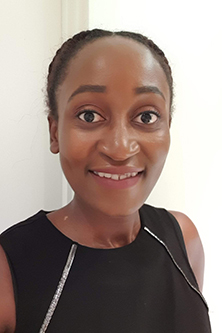Suko Ndlovu
Suko Ndlovu

- Country of origin: Zimbabwe
- MSc course: Quantitative Finance
- Graduation year: 2021
In my previous role as a developer in banking, I worked a lot with financial data, which got me curious about the ins and outs of banking, the markets, and the economy. I have always been passionate about mathematics and computing, combined with my interest in Finance, the MSc Financial Mathematics seemed like the next best step in my career. However, I did eventually transition to the MSc Quantitative Finance Course.
Bayes has a good reputation in and outside of the country, housing some industry experts in each field. Also, the location of the school and the links it has to the city (fintech/finance/etc.) means, not only would I benefit from the excellent research but also have opportunities to be exposed to current industry practices.
I enjoyed the course, especially having an opportunity to try different topics in the first third of the course helped a lot in really narrowing down my interests and what I wanted to specialised in. This helped me make the decision to transition from MSc Financial Mathematics to MSc Quantitative Finance course.
The diverse group of students. It was a great opportunity to learn with people from different backgrounds (profession / nationality / education). I have a good network I can reach out to now for advice in different areas of work and interests.
Could you tell us about your current career?
I currently work as a Data Analyst/Consultant in the professional services branch of a FinTech start-up that specialises in providing a FICC qualitative and quantitative analytics tool to financial institutes (mainly banks). The role involves carrying out what is a called an Implementation Analysis for clients i.e., data consultancy to gauge the health of their data, soundness, and efficiency of existing infrastructure of their existing data analytics and then provide recommendations for any existing gaps.
The tool build by my company uses some quantitative models, alongside IA and ML to produce analytics (including predictive analytics). Because I work on the client facing side, I need to have a good understanding and grasp of the product, data, underlying processes and models enough to be able to have constructive conversations with the client (on their data analytics needs / use of data). Also, understanding how the data can be used in the different metrics and analytical outputs helps when we do gap analysis and give recommendations to the clients.
What advice would you have for students considering MSc Quantitative Finance at Bayes Business School (formerly Cass)?
This is a very good opportunity to explore the different fields and topics in Financial Engineering / Quants. You can utilise your exposure to the different industry research experts and gain a broad knowledge in various topics but also gain deep skills and knowledge in your eventual chosen discipline/topic.
I completed my masters fully remotely (during Covid), but regardless of the challenges associated with adapting to online learning for both the students and the institution, the professors were all always willing to help and made an effort to make sure we understood the content and applications of it. The professors were all very dedicated to delivering the best. I truly appreciate all the effort they put into me succeeding in the course. You are in good hands if you choose to study Quants at Bayes Business School.